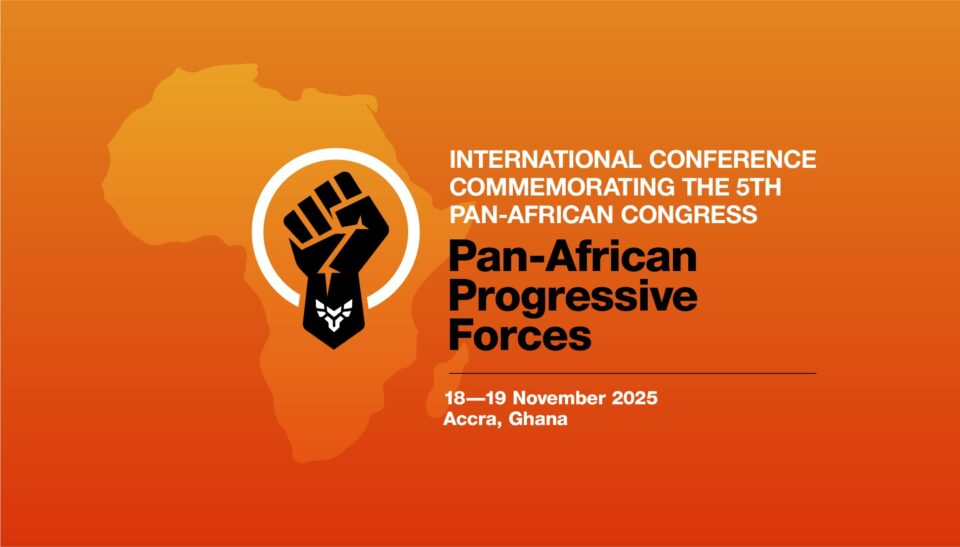

In October 1945, in the city of Manchester, England, a defining moment in modern African history took place: the convening of the 5th Pan-African Congress. This gathering brought together liberation leaders, trade unionists, students, and intellectuals from across Africa and the diaspora to map out the final struggle for Africa’s independence.
In November 2025, in the city of Accra, Ghana, over two hundred fifty delegates from 56 countries representing Africa, the Caribbean, and the wider Black world will gather for a conference to forge a collective vision for self-rule and dignity.
The conference took place at the Kwame Nkrumah Mausoleum on November 18-19 to commemorate the 80th Anniversary of the 5th Pan-African Congress. This gathering, the International Conference of Pan-African Progressive Forces Commemorating the 5th Pan-African Congress, was organized under the theme: “From Historical Memory to Economic and Political Justice.”
The conference was organised by the Pan-African Progressive Front, a movement that unites various organisations across Africa and the diaspora in the struggle for a free, strong and progressive continent.
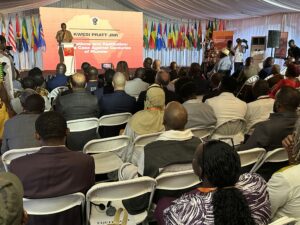
SESSION I: ‘Political Unity and African Sovereignty – From Nkrumah’s Dream to 21st Century Reality’
Dr. Gamel Nasser Adam delivered a keynote address titled “Africa’s Underdevelopment: From Colonialism to Neo-Colonialism.” After a 30-minute presentation, delegates discussed the following issues:
- In what way and to what extent should Africa receive reparations from the colonizing countries?
- What are the ways to combat the neocolonial policies of Western countries?
- How to stop the plundering of natural resources by Western-affiliated companies?
- How to free oneself from the oppression of loans with enslaving conditions issued by the IMF and other similar organizations.
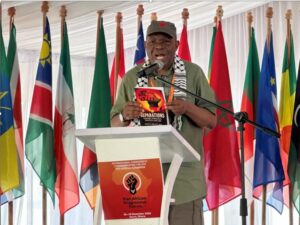
SESSION II: ‘Economic Justice and Alternatives to the Existing Global Economic Order’
Prof. Akua Britwum delivered a keynote address on the topic: ‘How Global Financial Power Shapes the Lives of Working Women in Africa’, where she described in detail the unenviable conditions of African women today.
Participants discussed the opportunities available in contemporary African realities for the emancipation of women, the development of female education, and the creation of equal opportunities for the self-realization of African women.
SESSION III: ‘Reparations, Historical Justice, and the Restoration of Dignity’
Kwesi Pratt Jnr, member of the PPF Coordinating Committee, delivered a report titled ‘Reparations and Restitution: Africa’s Case Against Centuries of Plunder’.
At this session, delegates agreed that it is time to move from words to concrete actions on the issue of “reparations”. Key proposals included:
- The creation ofa single African reparations fund to manage the receipt and fair distribution of funds.
- The establishment ofa unified legal institution to calculate damages and file claims in international courts.
- The introduction ofcustoms duties on the export of goods from former colonizing countries.
There were also proposals for African countries to file lawsuits demanding the return of cultural treasures, which hold enormous historical and cultural significance for Africans but remain on the shelves of European museums.
The central idea of the discussion was the creation of a multipolar world, in which Africa, as a great continent with vast natural and human resources, should assume a leading position. Reparations were framed not only as the repayment of debts for centuries of plunder and slavery, but also as an acknowledgment by Western countries of their crimes and a prerequisite for equal and respectful dialogue.
SESSION IV: ‘Africa’s Role in the Global Context – Anti-neocolonial Solidarity and Building Ideological Unity’
Professor Smail Debeche of the National Liberation Front (NLF), Algeria, delivered a report on the topic: ‘Africa and the Global South: Forging a New Solidarity’. The report highlighted issues of disunity in the African world and the need to erase borders for African countries and the diaspora. Uniting in the fight against Western neocolonialists was identified as a key to unlocking incredible benefits for all Africans.
Delegates discussed the possibility of visa-free travel between African countries, the creation of industrial corridors, and mutual settlements in local currencies. Economic unification and the dismantling of political borders were identified as the path to African prosperity.

The significance of the event was underscored by the participation of His Excellency President John Dramani Mahama, the African Union Champion for Reparations. In his keynote speech, the President highlighted the urgent priorities facing the continent: economic transformation, technological sovereignty, climate justice, regional integration and democratic accountability.
One of the significant announcements he made was the introduction of a “League of African Free Movement,” which will initially involve seven African countries agreeing to abolish visa requirements among themselves.
He revealed that he would be writing formally to the leaders of the participating states.
“For those seven countries, if any of our citizens want to travel to each other’s countries, they won’t require a visa,” he said, calling it a practical step toward unity.
He expressed disappointment that Africans still face travel hurdles within their own continent, stating, “it is a shame that we still have to travel to each other’s countries asking for a visa.”
He encouraged African leaders, youth and workers to recommit to the ideals that guided the liberation struggle eight decades ago. “Africans will determine Africa’s destiny.”
Quotes from the President’s speech:
“The world must understand that Africa will not be asked to choose between development and sustainability. We demand both. Indeed, we deserve both, and we will pursue both.”
“Eighty years ago… the Fifth Pan-African Congress became the turning point that accelerated the liberation of our continent from colonial domination.”
“Our generation faces new forms of domination, some subtle, some obvious. Africa is rich in natural resources but poor in global influence.”
“Our vision for a reset Ghana is inseparable from the vision of a reset Africa.”
Words of support and solidarity were expressed by:
- His Excellency John Kofi Agyekum Kufuor, Former President of the Republic of Ghana.
- A representative of His Excellency Nicolás Maduro, President of the Bolivarian Republic of Venezuela.
- More than 10 other high-ranking representatives from various countries.
Amandzeba Nat Brew, a renowned Pan-African artist, composed the Pan-African Anthem specifically for the commemoration of the 5th Pan-African Congress. During the official opening of the conference, he took the stage and delivered the anthem’s premiere performance.
Following the solemn opening, conference delegates conducted the “BLACK STAR” PERFORMANCE in commemoration of the 80th Anniversary of the Fifth Pan-African Congress of 1945. They lined up around the monument of Kwame Nkrumah in the shape of a star and lit lights above their heads. This action paid tribute to the great Pan-Africanist and affirmed a commitment to his ideas for creating a strong, united and independent Africa.
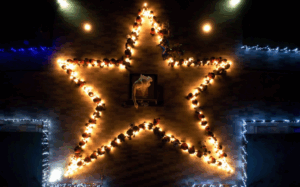
Additionally, on the sidelines of the conference, the Pan-African Progressive Front organized an exhibition titled “Museum of Stolen Artifacts.” Twenty blank canvases symbolized the void left by the plundering of African cultural heritage by colonialists. Each canvas featured a QR code, which, when scanned, revealed information about the stolen sacred objects, their significance to African culture, and their current locations in foreign museums.
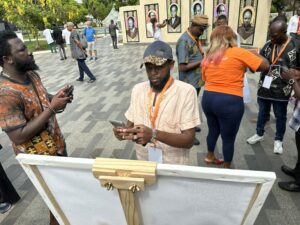
Over the two days of the conference, delegates developed and adopted two declarations. The first, the Accra Declaration, consists of economic and political theses—concrete steps for the development of the African world. This declaration outlines Africa’s path to independence and prosperity for decades to come. The second, the Accra Declaration on Reparatory Justice, outlines specific steps for obtaining reparations.
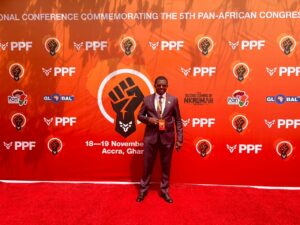
A key priority shall be the creation of a Pan-African institutional architecture for reparatory policy, initially composed of the following mechanisms:
A Joint Institute for the Assessment of Harm and Documentation of Colonial Legacies, tasked with developing unified methodologies, consolidating archival materials, and generating expert analysis for multilateral and relevant international mechanisms;
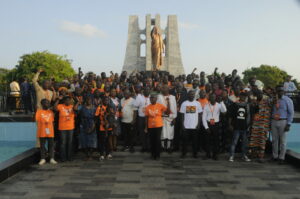
A Pan-African Reparatory Justice Fund, operating under principles of transparency and accountability, to fund and implement priority programs in education, health, infrastructure, and culture.




